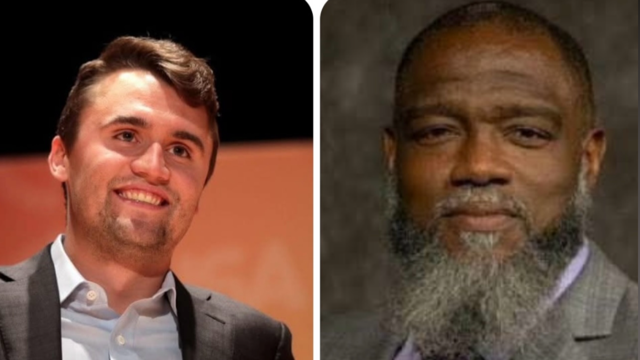With the sudden death of pastor and theologian Voddie Baucham, Christendom has now lost two giants of the faith in two weeks. These were men bold as lions with deep faith, integrity, compassion, and humility—qualities sadly lacking even in many Christian leaders today. Both Baucham and Charlie Kirk understood that Jesus reigns over all creation, and, therefore, they refused to restrict the light of truth to church sanctuaries.
In a recent Ezra Institute podcast about the failure of Christianity Today and The Gospel Coalition to address the Kirk assassination properly, Dr. Michael Thiessen, Pastor Nate Wright, and Dr. Joe Boot describe the idea that the church should steer clear of politics—an idea that has taken root in far too many churches—as “ludicrous.”
Both Baucham and Kirk knew that renewal in the country; restoration of a culture that seeks the good, the true, and the beautiful; and reestablishment of a public square conducive to human flourishing cannot be achieved in a Godless vacuum. They knew that political issues pertaining to, for example, sexuality, marriage, and abortion are inherently and inextricably religious.
Baucham and Kirk worked tirelessly and unapologetically to preach the good news of Christ’s work on the cross, while concurrently refuting the propositional errors on political issues, an exercise that often leads people to Christ. Seeing ideological errors often leads sinners to seek the source of all truth.
For decades, many pastors and priests have for argued implicitly for a “naked public square.” The Ezra Institute speakers warn that “we’ve so truncated the message of the gospel, that everything else has been handed over … to a secular neo-pagan state.” This truncated gospel retains its “message of love and grace,” but has been stripped of its “message of righteousness, holiness, justice, truth, [and] judgment.”
They argue that by “imprison[ing] Scripture … within the four walls of the Church,” we have shrunk “the issues that are considered addressable by Christians.” This constitutes a “retreat” into a “pietistic bubble,” a retreat that Kirk discerned is being rejected by his generation who are “tired of” an “escapist, retreatist, dualistic Christianity that ecclesiasticized the Word of God and let culture and the world go to hell in a handbasket.”
Richard John Neuhaus, a writer and Lutheran pastor who converted to Catholicism, argues in The Naked Public Square that a polity denuded of religion will be clothed soon enough in some other system that functions as religion by providing “normative ethics.”
A democratic republic cannot exist without objective normative ethics that render legitimate the delimitation or circumscription of individual rights. Historically, the sources of the absolute, transcendent, objective, universal truths that render legitimate our legal system have been “the institutions of religion that make claims of ultimate or transcendent meaning.”
Neuhaus explains that this “does not represent an imposition of the private into the public spheres, but rather an expansion or transformation or recollection of what is public.” He argues that when religion is utterly privatized and eliminated as a “source or transcendence that gives legitimate and juridical direction and form, something else will necessarily fill the void, and that force will be the state.”
Maybe Kirk’s generation longs for a faith that “is living and active, sharper than any two-edged sword, piercing to the division of soul and of spirit, of joints and of marrow, and discerning the thoughts and intentions of the heart.”
Maybe they long to be part of a movement that is worth dying for, one that Martin Luther King Jr. wrote about in Letter from Birmingham Jail:
There was a time when the church was very powerful–in the time when the early Christians rejoiced at being deemed worthy to suffer for what they believed. In those days the church was not merely a thermometer that recorded the ideas and principles of popular opinion; it was a thermostat that transformed the mores of society. Whenever the early Christians entered a town, the people in power became disturbed and immediately sought to convict the Christians for being “disturbers of the peace” and “outside agitators.” But the Christians pressed on, in the conviction that they were “a colony of heaven,” called to obey God rather than man. Small in number, they were big in commitment. They were too God-intoxicated to be “astronomically intimidated.” By their effort and example, they brought an end to such ancient evils as infanticide and gladiatorial contests.
For decades, Christians, including church leaders, political leaders, and laity, have cowered in their churches and self-censored outside their churches. They’ve fretted that if they spoke boldly about their faith, or about marriage, or about sexuality, their neighbors or colleagues might be angry at them or call them mean names. They worried about their jobs long before their jobs were in jeopardy. They have been embarrassed to admit they serve a risen Christ, and they have been ashamed of the gospel. They have refused to expose the unfruitful works of darkness. And they have failed to take seriously these words of Christ:
Not everyone who says to me, ‘Lord, Lord,’ will enter the kingdom of heaven, but the one who does the will of my Father who is in heaven. On that day many will say to me, ‘Lord, Lord, did we not prophesy in your name, and cast out demons in your name, and do many mighty works in your name?’ And then will I declare to them, ‘I never knew you; depart from me, you workers of lawlessness’ (Matthew 7:21-23).
The Ezra Institute speakers conclude with this: “The empty cross is a reminder, not just of the death of Christ, but that he is ruling and reigning. He’s not on the cross anymore. He’s at the right hand of God. … And he’s ruling now the nations with a rod of iron.”
Voddie Baucham and Charlie Kirk never for a moment forgot who rules the nations, and so, they fearlessly took up their crosses daily to follow Christ.
